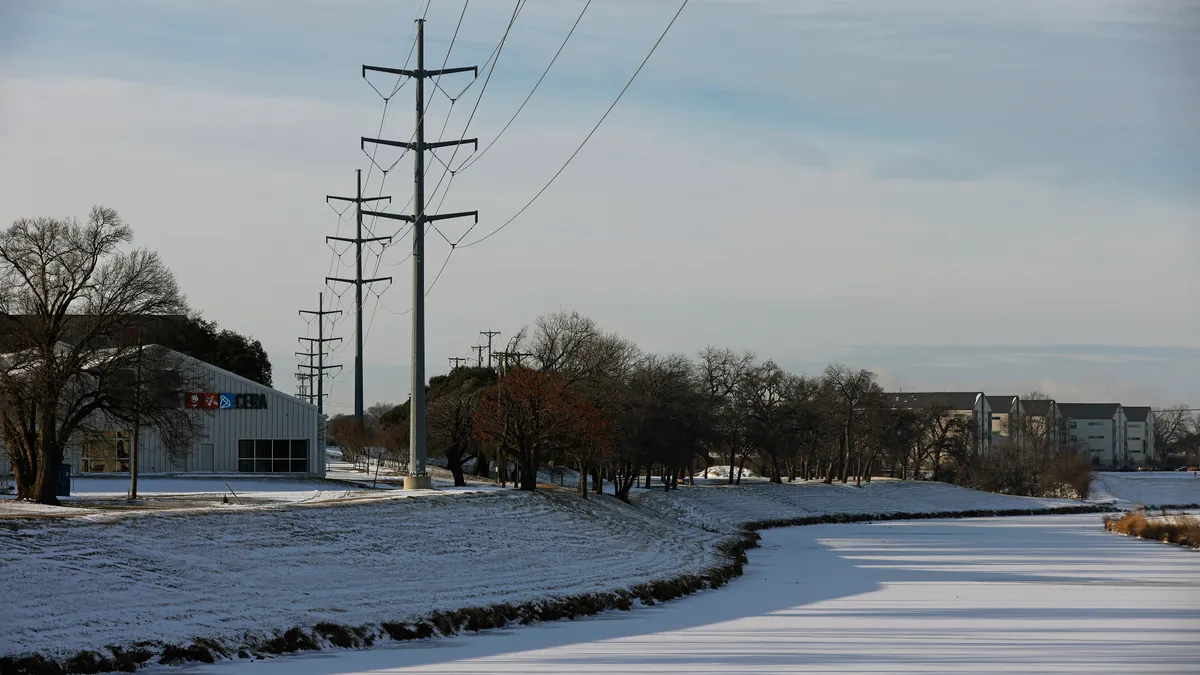Dive Brief:
- There is "anecdotal evidence" of natural gas price gouging in Texas during February's winter storm Uri, according to an official with the North American Electric Reliability Corp. (NERC). Millions were left without electricity during the storm as power plants struggled to obtain fuel and freezing temperatures halted some wind production.
- Wellhead freeze-offs accounted for a large portion of the gas issues, as well as, to a lesser extent, power outages at compressor stations that move gas through pipelines, NERC Chief Technical Advisor Thomas Coleman said during a presentation on Friday to the Electric Reliability Council of Texas (ERCOT).
- Texas regulators are rushing to make grid and market improvements ahead of potential freezing temperatures this winter. On Thursday, the Public Utility Commission of Texas (PUCT) approved changes to the state's wholesale markets intended to improve reliability when electricity supplies become scarce.
Dive Insight:
Coleman's presentation to an ERCOT working group sheds new light on February's outages across Texas and the U.S Southwest, and raises questions about whether consumers were cheated by gas producers.
A November joint report by NERC and the Federal Energy Regulatory Commission concluded that a combination of freezing and fuel issues caused about three-quarters of the unplanned generating unit outages, derates and failures to start in February. Of those, gas-fired units experienced 58% of all generator issues.
Most of the problem came from frozen gas facilities and, to a lesser extent, gas compressor facilities that lost power when electricity companies cut power.
"When we look at compressor stations that are electric, it's not a whole lot of critical mass in Texas," Coleman said during the presentation. "So most of this big drop [in gas production] is a result of freezing and winter conditions and not a loss of power to these facilities."
There is also "anecdotal evidence" of producers not delivering on long-term supply contracts, and instead selling gas on the spot market for much higher prices, Coleman said.
However, those questions are outside of the reliability organization's purview, and will be addressed in a broader inquiry by FERC, according to a NERC spokesperson.
"Because enforcement investigations and the information obtained are non-public until disclosed by the commission, we cannot confirm or comment regarding investigations," FERC spokesman Craig Cano said in an email. However, the commission’s Office of Enforcement issued its annual report last month which includes some insight into FERC's approach to the February event.
"There was a significant increase in the total number of natural gas screen trips and surveillance alerts during the cold snap," the report said. Two incidents were ultimately referred by staff to the commission's Division of Investigations (DOI).
FERC's Division of Analytics and Surveillance (DAS) is also reviewing the activity of one market participant in Southwest Power Pool, according to the report. As of the end of fiscal year 2021, "this examination remains ongoing, and DAS may refer additional matters to DOI as new information comes to light."
Texas Attorney General Ken Paxton in March launched an investigation into natural gas price increases in the state. Paxton's office did not respond to questions about the status of the investigation.
If there is evidence of price gouging, "I think it makes sense that some or all of those penalties ought to be put towards helping customers," said Doug Lewin, an energy analyst and president of Stoic Energy. Lewin also discussed Coleman's presentation in a Twitter thread on Monday.
"I'm continually just struck by a complete lack of any sort of [customer] protections," he said.
Customers faced bloated gas and power bills following the storm, and according to the Houston Chronicle those costs may rise into the billions.
Regulators at the PUCT, which oversees electricity but not gas markets, have been working to ensure the catastrophe does not repeat. The Railroad Commission of Texas regulates gas exploration, production and transportation in the state, but the office referred market questions to Paxton's office.
Earlier this month, the PUCT adjusted ERCOT's electricity scarcity pricing mechanism, lowering the high system-wide offer cap to $5,000/MWh from $9,000/MWh. And on Thursday, the commission adjusted a formula known as the Operating Reserve Demand Curve to provide earlier price signals "to bring additional generation online and for large consumers to adjust their demand."
“This is a move away from the crisis-based business model we have operated under for the past two decades. This new model centers on reliability," PUCT Chairman Peter Lake said in a statement.














